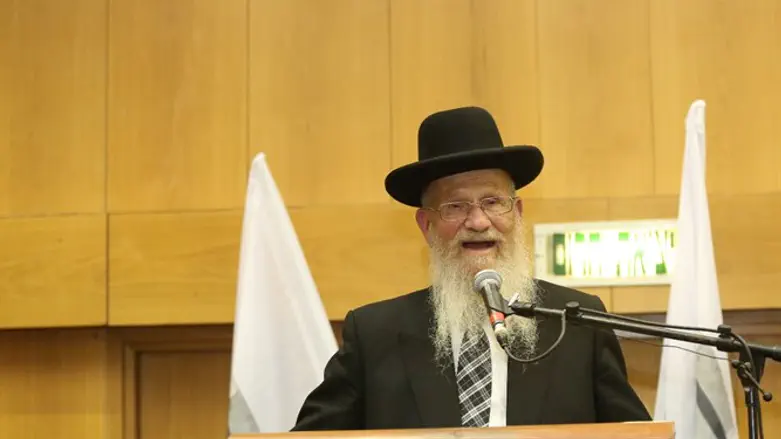
Yesterday, Rabbi Yeshayahu Hadari, a teacher of thousands, and one of the pillars of Torah teaching in Israel, passed away and was laid to rest.
Of his thousands of students, there are many who knew him better than I did. Thoughts and feelings are still raw and not fully developed, and it is challenging to translate one’s personal experience into words that can relate to those who never met him. With these caveats acknowledged, I hope to do justice to his persona, and pray that I am able to convey a picture of the Gadol we lost so suddenly.
Rabbi Hadari’s biblical namesake, Yeshayahu (Isaiah), is a person of vision – "Chazon" Yeshayahu. What did Rabbi Hadari see? In purely material and historical terms, an incredible amount. Born in Tel Aviv in 1933, as a young boy he saw the birth of Israel. In fact, on the day independence was declared, he stood outside Beit Ha'am (today Independence Hall), and shook the hands of Ben Gurion and the dignitaries who had just declared the Jewish State. He witnessed its birth, and everything that happened since, as Rabbi Hadari never left Israel in his entire life. Until his passing yesterday morning, he was one of the few people to have been present for every second of Medinat Yisrael’s existence.
However, in its biblical sense, a Chazon/vision means to see that which isn’t in front of you, and this type of vision was embodied by Rav Hadari. He lived the Jewish past, and in his Shiurim (lectures), he would paint a picture and bring Jewish history to life. From Biblical scenes of David fleeing from Avshalom and the Jews being exiled to Babylon, to the 18th century hassidic court and 19th century Yeshiva – all of these were vividly alive and real for Rav Hadari, and to enter his classroom was to be transported into these rich visions.
But he also had a vision of the future, and since the 1960s, has played an instrumental role in making the Torah world as we know it today. At that time, there were few institutions of Torah study, and fewer in the Modern Orthodox/Religious Zionist world, and Rav Hadari was at the forefront of modern Torah teaching. He was the Mashgiach of Kerem BYavneh, the first Hesder Yeshiva in which students combined Torah study and IDF service. He was one of the first teachers at Michlala College for Women, the first institution to provide high level Torah education for women. And just two months after Jerusalem was reunited in 1967, Rabbi Hadari founded Yeshivat Hakotel in the Old City of Jerusalem, to ensure that a Jewish presence, and the study of Torah should be firmly established in heart of Jerusalem. In his teaching, he also broke new ground, combining the traditional Yeshiva syllabus of Gemara and Mussar with the study of Tanach and Hassidic thought.
Today, the Hesder movement, women’s Torah study, a Jewish presence in the Old City, and expanded horizons of Torah study are taken for granted. But there was a time when they were not, and they were merely visions. Rav Hadari was one of those visionaries, who built the Torah world we live in today. Due to his involvement in three central institutions – Kerem BYavneh, Michlalah and Hakotel, it is not innacurate to see him as a patriarch, or founding father, of the Modern Orthodox/Religious Zionist Torah world.
The name Yeshayahu captures the vision, and his family name, Hadari, captures another half of what made him so special. Hadari comes from the word Hadar, which means splendour or glory. Torah as lived and taught by Rav Hadari was glorious; he inspired, elated the spirit, and made one feel connected to something truly transcendent. From the dancing to greet Shabbat, the brilliance of a hassidic insight, to the stories of the Yeshivas of yesteryear, Rabbi Hadari spoke not just to the mind, but to the soul. Every part of Jewish life was infused with depth and meaning - Rabbi Hadari would cry in trepidation at the onset of Yom Kippur, and cry with joy on Yom Yerushalayim.
He exemplified how Torah does not make one deny his personality, but enriches it – he was so charismatic, and full of humour, and he encouraged his students to develop their personalities and talents. He infused his Torah teaching with a connection to the Jewish people and Medinat Yisrael, as Torah was supposed to inspire us, not to lead to a sheltered life. As he would weave together sources from the length and breadth of Torah, peppered with stories and witticisms, one felt they were not just learning, but experiencing, God’s Torah. Rabbi Hadari taught Torah in a way that lifted one up, and he broadened the spiritual horizons of thousands of students.
There is so much more that he embodied – the fusion of tradition and innovation, the combining of intellectual breadth with spiritual depth, so much more that is beyond the scope of this eulogy.
Yesterday, thousands of students mourned, and accompanied Rabbi Hadari on his final journey. He leaves behind a tremendous legacy, of all that he imparted to his students: Knowledge, warmth, inspiration, charisma, humility, dignity – but above all, the truly precious gift, of glorious visions.
Tehei Nishmato Tzrura Bitzror HaChayim. May his soul be bound up in the bond of eternal life.
Aaron White has been part of the Yeshivat Hakotel program for overseas students for eight years.
